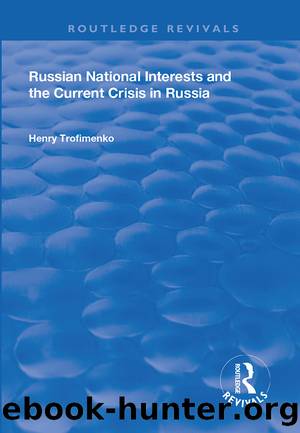Russian National Interests and the Current Crisis in Russia by Henry Trofimenko

Author:Henry Trofimenko [Trofimenko, Henry]
Language: eng
Format: epub
Tags: Social Science, General
ISBN: 9780429786082
Google: iAGaDwAAQBAJ
Publisher: Routledge
Published: 2019-05-23T03:47:25+00:00
One has to add that by signing the Founding Act, Russia voluntarily struck out the Helsinki Final Act of 1975 that fixed the post World War II order in Europe and opened up opportunities for building a new post-Cold war Europe by creating an institution for this purpose - the Conference for Security and Cooperation in Europe (CSCE) which was later turned into the Organization for Security and Cooperation in Europe (OSCE), with exactly that purpose in mind. This Act assigned to Russia equal status with other participants (all European countries plus the US and Canada) and an important role in building the new Europe. Most of the political changes that have taken place in Europe since that time have come under the auspices of the OSCE. Despite the fact that the Founding Act pays lip service to the OSCE, calling it âthe only pan-European security organizationâ that âhas a key role in European peace and stabilityâ,17 the Act actually liquidated this aspect of the OSCEâs role and transferred the appropriate functions to NATO, where Russia will play the role of a charwoman. A US State Department official who invented the heading for the agreement between Russia and NATO, fixing such a new Russian role, was smart enough to name it the Founding Act. As a result, the document creates the illusion of continuity of the Helsinki process, while in fact, through its very content, it makes a total break with it, and de facto annuls the Helsinki Act of 1975 as far as procedures for all-important European decisions are concerned.
Yeltsin definitely did not understand all the long-term negative implications of the Founding Act for Russia. When signing it in Paris on 27 May 1997, Yeltsin, in a fit of rapture for such a âhistoric achievement of Russian diplomacyâ, announced that he would take all the nuclear warheads aimed at the NATO countries off Russian nuclear missiles.18 It took a week of non-stop clarifications by Russian military and diplomats to explain to the world that the President just meant zero targeting of the appropriate warheads, not really dismantling them!
Finally, one more negative repercussion for Russia, stemming from its approval of NATOâs expansion and the resulting deal with the bloc, was that by acting in such a way, Moscow itself contributed to its isolation in the future. If Russia had stood firm on NATO enlargement, it, at least, might have retained a strong influence over the successor states on this issue. Now, when Russia is lounging around the bloc, it is much harder to stop them joining NATO. It would hardly have been feasible, for instance, for Ukraine to challenge Russia by signing a Charter with the bloc, with its essentially anti-Russian implications (as Ukraine did at the Madrid NATO summit), if Russia had adamantly opposed the blocâs expansion. And if Ukraine went âthe Russian wayâ, and, probably, will go even farther, why not Moldova, not to speak about the Baltics?
Download
This site does not store any files on its server. We only index and link to content provided by other sites. Please contact the content providers to delete copyright contents if any and email us, we'll remove relevant links or contents immediately.
Man-made Catastrophes and Risk Information Concealment by Dmitry Chernov & Didier Sornette(6009)
The Revenge of Geography: What the Map Tells Us About Coming Conflicts and the Battle Against Fate by Kaplan Robert D(4076)
Zero Waste Home by Bea Johnson(3834)
COSMOS by Carl Sagan(3618)
Good by S. Walden(3549)
In a Sunburned Country by Bill Bryson(3537)
The Fate of Rome: Climate, Disease, and the End of an Empire (The Princeton History of the Ancient World) by Kyle Harper(3060)
A Wilder Time by William E. Glassley(2859)
Camino Island by John Grisham(2797)
Organic Mushroom Farming and Mycoremediation by Tradd Cotter(2689)
The Ogre by Doug Scott(2679)
Human Dynamics Research in Smart and Connected Communities by Shih-Lung Shaw & Daniel Sui(2500)
Energy Myths and Realities by Vaclav Smil(2488)
The Traveler's Gift by Andy Andrews(2458)
9781803241661-PYTHON FOR ARCGIS PRO by Unknown(2365)
Inside the Middle East by Avi Melamed(2352)
Birds of New Guinea by Pratt Thane K.; Beehler Bruce M.; Anderton John C(2254)
A History of Warfare by John Keegan(2240)
And the Band Played On by Randy Shilts(2199)
